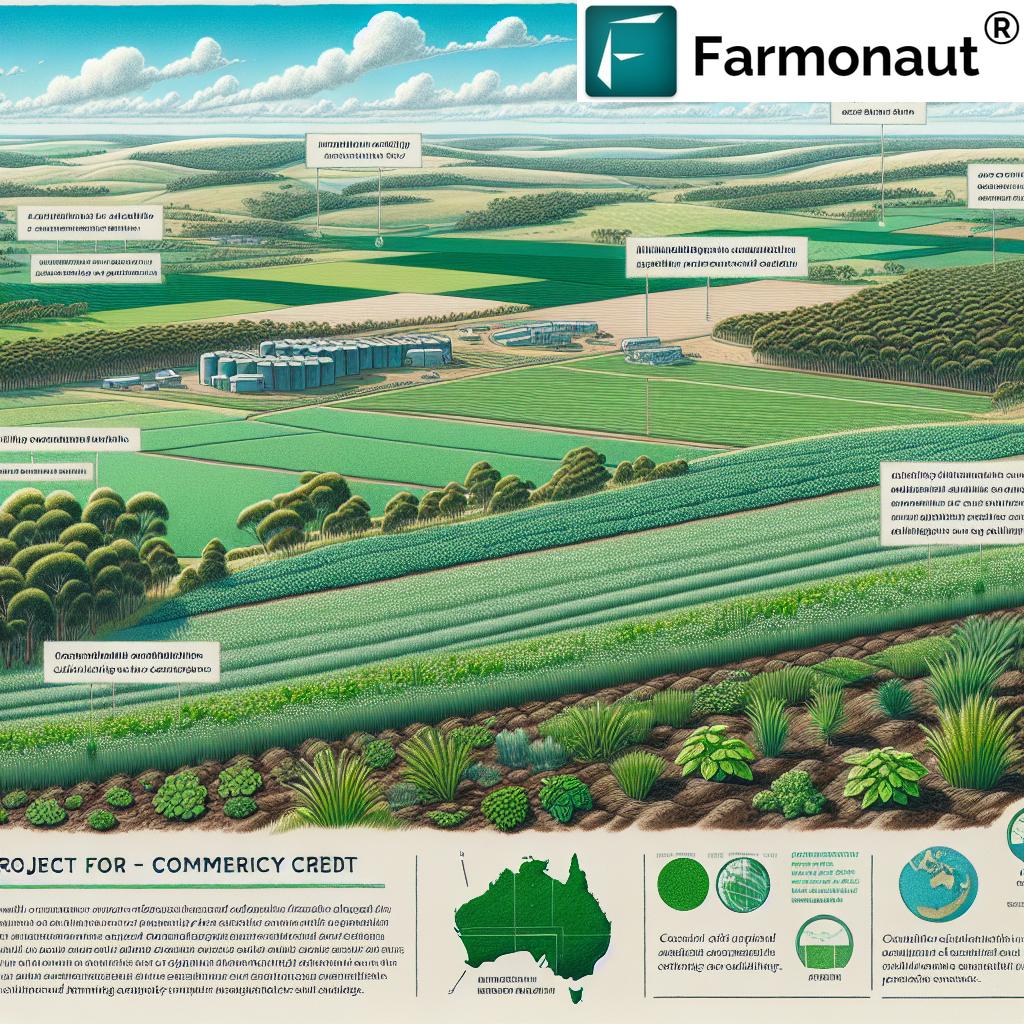- Agricultural Career Opportunities in Australia: Prospects and Trends for 2025
- Expanding Horizons: The Evolution of Agricultural Careers
- Agricultural and Agri-Tech Job Growth Trivia
- Emerging Agricultural Science Career Opportunities
- Comparative Career Opportunities Table
- Agriculture Job Opportunities in Australia: Current Landscape
- 2025 Agricultural Career Trends and Skills in Demand
- Impact of Technology and Precision Farming in Australian Agriculture
- Sustainability, Environmental Stewardship, and Conservation Roles
- How Farmonaut Empowers Agricultural Professionals
- Valuable Resources and Training Support for Aspiring Professionals
- FAQ: Agricultural Science Career Opportunities in Australia
- Conclusion: Shaping the Next Generation of Agricultural Careers in Australia
Agricultural Science Career Opportunities in Australia: Prospects and Trends for 2025
Australia’s agricultural sector remains a pillar of the nation’s economy and rural identity, offering an impressive and diverse array of career opportunities. As 2025 unfolds, the integration of technology, sustainability, and market demands is transforming the nature and scope of agricultural science career opportunities. Today, farms blend traditional practices with cutting-edge agritech, precision farming, and environmental stewardship.
For individuals considering a career in agriculture, it is crucial to understand the available roles, prospects, and evolving trends. This blog offers a comprehensive exploration of agriculture job opportunities in Australia, with practical insights for students, job seekers, and professionals invested in innovation, resource management, and sustainability.
Expanding Horizons: The Evolution of Agricultural Career Opportunities
While images of agriculture may conjure up scenes of crop cultivation and livestock management, the scope of agricultural career opportunities in Australia now extends well beyond traditional farm work. Driven by advances in technology, evolving government initiatives, and a growing emphasis on sustainability, agricultural science career opportunities have multiplied.
- Research and Development: Innovations in genetics, pathology, pest resistance, and agroecology are advancing food production techniques and sustainability practices.
- Agribusiness and Supply Chain: The agribusiness sector incorporates finance, marketing, logistics, and blockchain-enabled traceability.
- Environmental Conservation and Biosecurity: Roles now include environmental consultants and biosecurity specialists, who manage compliance with regulations and land-use planning.
- Digital Agriculture and Precision Farming: Using drones, satellites and AI analytics, modern farmers and managers can optimize planting, fertilizing, and resource management like never before.
These expanding horizons in agricultural careers are propelled by growing market demands, global climate change pressures, and a renewed focus on resilience for food security and resource stewardship.
Agricultural and Agri-Tech Job Growth Trivia
Emerging Agricultural Science Career Opportunities
Agriculture today is deeply intertwined with science, technology, and data analytics. Precision agriculture jobs, agronomy specialists, AI data scientists, and resource management experts form only a portion of potential career pathways.
Key Career Pathways in Agricultural Science:
- Agricultural Scientist: Leading research to improve crop yields, develop pest-resistant plants, enhance soil health and promote overall sector sustainability.
- Farm Manager / Sustainable Farm Manager: Managing complex operations, workforce, financials, and compliance on modern large-scale farms. Focus shifts toward sustainable and data-driven practices.
- Agronomist: Specializing in soil science, plant growth, crop planning, and best-practice fertilizing and pest management.
- Agricultural Technician: Supporting scientists and farmers by operating equipment, collecting field data, and assisting with experimental trials.
- Agricultural Data Analyst: Leveraging AI and big data analytics to inform strategic planning and optimize production outcomes.
- Environmental Consultant: Providing expertise in conservation, land use, biodiversity, water management, and compliance with environmental regulations.
- Agri-Tech Engineer: Developing digital tools, new equipment, and technologies for precision planting, harvesting, and resource optimization.
- Biosecurity Specialist: Ensuring protection against pests, diseases, and maintaining safe supply chain practices.
- Agri-Finance and Risk Analyst: Combining agricultural knowledge with financial management to support farms and agri-business growth.
As the sector continues to transform, new opportunities are taking shape at the intersection of science, technology, and sustainability. Professionals skilled in data interpretation, digital tools, and AI-powered insights remain in high demand.
Comparative Career Opportunities Table: Agricultural Science Roles in Australia, 2025
| Career Title | Description | Required Qualification | Estimated Entry-Level Salary (AUD, 2025) | Projected Job Growth (%) | Example Technologies Used |
|---|---|---|---|---|---|
| Precision Agriculture Specialist | Implements and manages digital and automated solutions to optimize crop yields and resource use; leads technology adoption on farms | Bachelor’s in Agricultural Science, Agri-Tech, or Engineering; training in digital platforms | $68,000 – $78,000 | 22% | Drones, GPS, Satellite Imagery, AI Analytics, IoT Sensors |
| Agronomist | Advises farmers on soil, planting, fertilizing, pest control, and environmental conservation for improved crop production | Bachelor’s in Agronomy, Soil Science, or Agriculture | $60,000 – $72,000 | 15% | Soil Testing Kits, Mobile Ag Apps, Drones, GIS, Remote Sensing Tools |
| Agricultural Data Analyst | Interprets large sets of field and sensor data to optimize planning, resource allocation, and productivity for agribusinesses | Bachelor’s or higher in Data Science, Agricultural Science, or related field | $75,000 – $87,000 | 28% | AI, Big Data Analytics Platforms, Farmonaut’s Satellite Insights, Cloud Software |
| Sustainable Farm Manager | Manages farm operations with focus on sustainable practices, compliance, and environmental stewardship | Bachelor’s in Farm Management, Environmental Science, or Agriculture | $64,000 – $75,000 | 19% | Resource Management Platforms, Environmental Monitoring Tools, Fleet Management Solutions |
| Agri-Tech Engineer | Designs agri-machinery, smart equipment, and digital solutions to improve farming efficiency and sustainability | Bachelor’s in Engineering, Mechatronics, or Agri-Technology | $80,000 – $92,000 | 20% | Farm Automation, Robotics, IoT, Smart Machinery, AI Systems |
Australia’s agriculture job opportunities are both diverse and technology-oriented. Precision agriculture, data analytics, and sustainability are now key pillars shaping the future of the sector.
Agriculture Job Opportunities in Australia: Current Landscape
The current agricultural jobs landscape in Australia is robust and expanding. Over 300,000 people are directly employed across farming, agribusiness, technology, and research roles. Strong export demand for commodities like wheat, beef, wool, and wine sustains regional economies and provides a wealth of job prospects.
- Seasonal and Skilled Labor: Opportunities range from seasonal harvest workers to highly skilled technicians and managers.
- Government and Corporate Investment: Federal and state programs support training, innovation, and attracting youth and Indigenous Australians to agriculture.
- Modern Recruitment Channels: JobActive and specialized agricultural recruitment agencies connect job seekers with positions in crop production, equipment operation, environmental management, and precision technology.
- Diversification of Roles: From farmhands to AI analysts, the variety reflects the evolving nature and digital focus of the sector.
For students and professionals, the key to a rewarding career lies in training and upskilling in the latest technologies and sustainable farming practices. There is clear government support for diversity and inclusion, ensuring a new generation of professionals enters the field well prepared for Australia’s changing agricultural landscape.
2025 Agricultural Career Trends and Skills in Demand
As agriculture continues to evolve, professionals must adapt to changing technologies and market expectations. Key skills in demand for 2025 and beyond include:
- Digital Literacy: Proficiency with data platforms, drones, IoT, and satellite monitoring is now essential across many roles.
- Data Management & AI Analytics: Ability to collect, process, and interpret data for strategic planning, operational efficiency, and sustainability.
- Sustainable Land and Resource Management: Applying environmental stewardship techniques for compliance, climate adaptation, and improved resource use.
- Problem-Solving and Adaptability: Navigating changing regulations, climate uncertainties, and evolving market trends requires creativity and critical thinking.
- Teamwork and Communication: Effective collaboration among scientists, farm workers, agribusiness specialists, and environmental consultants is vital.
The demand for AI-driven advisory, blockchain traceability, and digital monitoring accelerates job growth within Australia’s agriculture job opportunities sphere. As precision agriculture, automation, and sustainable practices gain traction, those equipped with scientific and technology-forward skills will find themselves at the heart of the industry’s future.
Impact of Technology and Precision Farming in Australian Agriculture
Technology is a primary driver of agricultural job opportunities in Australia. Digital platforms, satellite-based monitoring, and real-time data analytics empower farm managers, farmers, scientists, and government agencies alike.
Examples of Agri-Tech Advancements:
- Satellite Monitoring: Real-time monitoring of crop health, soil conditions, and environmental impact via multispectral satellite imagery (e.g., NDVI analysis).
- AI-Driven Dashboards: AI platforms, like Jeevn AI Advisory by Farmonaut, deliver personalized strategies for yield optimization and risk management.
- Blockchain Traceability: Immunity against food fraud, ensuring transparency throughout the entire supply chain (Discover Farmonaut’s traceability solution).
- Precision Equipment and Drones: Implementation of unmanned aerial vehicles (UAVs) for crop monitoring, pest detection, fertilizer/pesticide spraying, and yield prediction.
- IoT and Fleet Management Solutions: Integration of digital tools for machinery planning, equipment telemetry, and logistics optimization (Farmonaut: Reduce operational costs and raise safety standards).
For students and early-career professionals, expertise in satellite platforms, sustainable farm management, and precision analytics is fast becoming a prerequisite for top roles.
-
Access Farmonaut’s API for custom satellite insights and agri-analytics integrations.
-
Farmonaut Satellite Weather API: Detailed developer documentation for tailored agri-tech solutions.
Sustainability, Environmental Stewardship, and Conservation Roles
A sustainable future for Australian agriculture relies on professionals who blend scientific knowledge with practice. Environmental stewardship and conservation are central to crop planning, soil health, water usage, and pest management.
- Environmental Consultants: Supporting farms, government, and companies in biodiversity management, water conservation, and sustainable planning.
- Conservation Scientists: Advancing natural resource preservation, working closely with landowners and policy-makers to implement effective land management strategies.
- Carbon Footprinting Analysts: Assessing greenhouse gas emissions from farm operations, guiding initiatives to meet national and global climate goals. Explore carbon footprinting platform for sustainable agriculture.
- Biosecurity Professionals: Maintaining Australia’s pest-free status through cutting-edge surveillance, risk planning, and rapid response to emerging threats.
These roles are increasingly data-driven and require expertise in environmental monitoring, compliance, and adaptive management. Career prospects in sustainability are projected to increase, as both government and consumers demand greater accountability and eco-friendly practices.
How Farmonaut Empowers Agricultural Professionals in Australia
At Farmonaut, we are dedicated to delivering advanced satellite-driven insights and AI-powered advisory systems for the entire agricultural sector. Our solutions empower farmers, managers, scientists, and business leaders by making real-time data accessible and actionable.
Our Platform Delivers:
- Satellite Imagery and Monitoring: We monitor crop health, soil conditions, and environmental indicators using multispectral satellite images. This data assists in informed decision-making for resource management, operational efficiency, and planning.
- AI Advisory via Jeevn: Our AI-driven Jeevn system provides customized weather forecasts, risk alerts, and productivity strategies directly to users.
- Blockchain Traceability: We enable secure, end-to-end traceability for food products and agri-resources, building transparency and trust. Read more about Farmonaut’s traceability benefits.
- Fleet and Equipment Management: We provide digital tools to optimize the use of farm equipment and vehicles, safeguarding assets and reducing costs. Unlock efficiency in farm operations.
- Environmental Impact Monitoring: We help businesses and government agencies monitor carbon footprints and adapt practices for a more sustainable, resilient future.
We ensure accessibility via the Farmonaut web application, Android app, iOS app, and API integrations, making our insights timely and widely available to all in the agricultural sector.
Our commitment is to drive innovation, productivity, and sustainability for all agricultural professionals in Australia and worldwide.
Valuable Resources and Training Support for Aspiring Agricultural Professionals
Starting or advancing in agriculture job opportunities in Australia requires the right training, resources, and career planning. Consider the following assets for building industry knowledge and skills:
- University Degrees & Diplomas: Tertiary pathways in agricultural science, agribusiness, environmental science, and data analytics are available at leading institutions nationwide.
- Vocational & Technical Training: Certificate and diploma courses in farm management, agronomy, sustainable practices, and equipment operation abound.
- Professional Associations: Membership in organizations like Ag Institute Australia and National Farmers’ Federation provides networking, ongoing training, and support.
- Government Scholarships & Grants: Both federal and state programs offer financial support for students and emerging professionals in rural and Indigenous communities.
- Digital Learning Platforms: Explore online courses in precision agriculture, remote sensing, and sustainability to upskill for the future workforce.
Additionally, access insights and real-time monitoring for practical training and hands-on learning experience via the Farmonaut platform.
FAQ: Agricultural Science Career Opportunities in Australia
A: In 2025, the most sought-after roles include precision agriculture specialists, agricultural data analysts, sustainable farm managers, agronomists, environmental consultants, and agri-tech engineers. These positions focus on integrating technology and sustainability to drive productivity in modern farming.
Q2: Which skills will help secure top agriculture job opportunities in Australia?
A: Digital literacy, proficiency with satellite platforms, data management, AI analytics, environmental stewardship, and strong problem-solving/adaptability skills are essential. Communication and teamwork abilities remain critical for collaborative work environments in the sector.
Q3: Can international students and professionals work in Australian agriculture?
A: Yes! Australia encourages skilled workers in agriculture, science, and agri-tech through various visa categories. Many universities and training providers offer international pathways, scholarships, and work placements in the field.
Q4: How is the market for agriculture job opportunities in Australia changing?
A: The market is shifting toward technology adoption, data-driven decision-making, and sustainability. This creates new job pathways in AI, precision farming, environmental conservation, and supply-chain traceability.
Q5: What is the starting salary in the agri-science sector?
A: Entry-level salaries for agricultural science careers in 2025 typically range from AUD $60,000 to $92,000, depending on specialization, educational level, and employer.
Q6: Where can I access practical tools and satellite data for agricultural training?
A: Comprehensive satellite monitoring, field insights, and advisory systems like Farmonaut’s platform enable practical learning and career planning. Access our web and mobile applications to experience hands-on industry technology.
Conclusion: Shaping the Next Generation of Agricultural Careers in Australia
In 2025 and beyond, agricultural career opportunities in Australia are characterized by a dynamic blend of innovation, scientific advancement, and sustainability. The sector remains a cornerstone of the national economy and identity, offering rewarding prospects for students, professionals, and rural communities alike.
From crop research and farm management to precision technology and environmental conservation, diverse roles await individuals committed to contributing meaningfully to food security and resource stewardship. Job opportunities are set to expand as government initiatives and private sector investments fuel a rapidly evolving market.
Equipping oneself with the right qualifications, digital competencies, and a passion for sustainable practices is the best route to a thriving career in agriculture. For those who embrace technology and innovation, the future in Australia’s agricultural sector is bright and full of possibility.
Ready to step into tomorrow’s farming landscape? Download Farmonaut’s app, explore our web platform, or access advanced analytics via API to support your journey!












